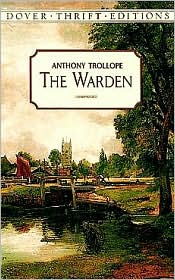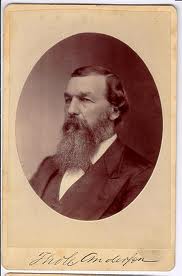“He was not so anxious to prove himself right, as to be so.”
For many years, the kindly and unambitious Rev. Septimus Harding has been warden of Hiram’s Hospital, a residence for poor men who have nowhere else to go, a place where they may live comfortably, get a small stipend from the estate of Mr. Hiram, and live out their lives in peace. The warden of Hiram’s Hospital has also been living at peace, until John Bold, a young reformer, questions why Mr. Harding, as warden, gets eight hundred pounds a year for accepting the title of warden, which does not require him to do much else. The bedesmen living in the hospital get only shillings, and Bold wonders whether the real intentions of Hiram’s bequest to establish the hospital, more than four hundred years ago, are being honored in the present.
the kindly and unambitious Rev. Septimus Harding has been warden of Hiram’s Hospital, a residence for poor men who have nowhere else to go, a place where they may live comfortably, get a small stipend from the estate of Mr. Hiram, and live out their lives in peace. The warden of Hiram’s Hospital has also been living at peace, until John Bold, a young reformer, questions why Mr. Harding, as warden, gets eight hundred pounds a year for accepting the title of warden, which does not require him to do much else. The bedesmen living in the hospital get only shillings, and Bold wonders whether the real intentions of Hiram’s bequest to establish the hospital, more than four hundred years ago, are being honored in the present.
In this first of the Barsetshire Chronicles, published in 1855, Trollope establishes the gently satiric tone and mood which pervade the series. Here he focuses on the church, its clergymen, and their roles in society, showing Rev. Harding to be a man of honor and trust (though a bit too comfortable and unimaginative to ask the hard questions) and contrasting him with Archdeacon Grantly, his son-in-law, who enjoys the power and perks of his position and feels that the world owes him whatever he can get from it. The stultifying church hierarchy sees its role as almost royal, above the fray and dedicated to sustaining itself.

The conflict which arises when John Bold and Tom Towers, an arrogant newspaperman, become allies in the investigation of the warden’s position becomes even stronger when some of the bedesmen are encouraged to demand one hundred pounds a year. Rev. Harding becomes the humiliated subject of editorials, pamphlets, and even a novel showing the “abuses” of his power. Dr. Pessimist Anticant, the pamphleteer, is thought to be a parody of Thomas Carlyle, and the novelist, Mr. Popular Sentiment, is thought to be Charles Dickens. The fact that John Bold, who started it all, is in love with the warden’s daughter creates further complications.
Trollope is a delightful writer whose style is to entertain the reader while raising some thoughtful questions. Though he takes his writing seriously and creates memorable characters behaving, as a rule, like real people, he does not take himself seriously, nor does he feel the need to be a social reformer. His humor and amiability give a freshness to novels like this one, which, despite its age, is amusing and perceptive. His later novels, like The Way We Live Now, are far more complex–but just as much fun.
Also reviewed here: Six additional novels by Trollope. See Authors tab at top of the Home page.
